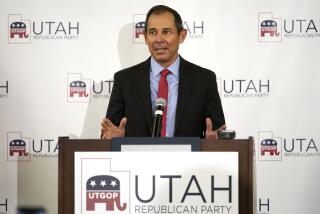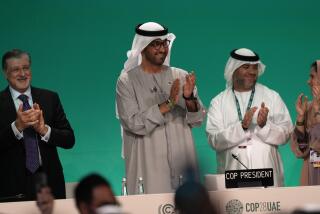Dead-ender presidency
GEORGE W. BUSH’S presidency is devolving into an extended holding action. On too many fronts, his top priority now appears to be delaying the inevitable.
Donald H. Rumsfeld, the former Defense secretary, once described the Iraqi resistance as a few “dead-enders” who refused to acknowledge that the world around them had changed. Increasingly that phrase applies as a self-portrait for the administration that Rumsfeld served. Forget “the decider.” Bush has become the dead-ender.
Example A is the debate over embryonic stem cell research, in which Bush has grown increasingly isolated in his determination to block broad federal funding. Religious conservatives back his stance. But when the Senate this month approved legislation to loosen the funding restraints that Bush set in 2001, the bill drew support from 525 medical, business, academic and civic organizations.
Fully 63 senators voted for the bill -- all but two Democrats in attendance and 17 Republicans, including conservatives such as Trent Lott and Orrin Hatch. Among the top Republican presidential contenders, only Mitt Romney stands with Bush; John McCain voted for the bill, and Rudy Giuliani indicated support. (Full disclosure: My wife works in McCain’s Senate office.) Every major Democratic presidential candidate also supports broader funding. Bush may hold the line with a veto, but the odds are overwhelming that the next president will reverse his direction.
The same is true on global warming. Bush hasn’t completely ignored the problem. He’s increased federal research on such green technologies as clean coal and advanced biofuels. But he opposes the critical step that could move such ideas from the lab to the marketplace: mandatory requirements for industry to reduce the emissions of carbon dioxide and other gases linked to global warming.
BUSH’S POSITION leaves him, like the polar bears threatened by receding Arctic ice, clinging to shrinking ground. In a recent Gallup Poll, four-fifths of adults supported mandatory greenhouse gas reductions. Even two-thirds of Republicans agreed.
Just as dramatic is the realignment in the boardroom. In January, leading companies, such as General Electric and Alcoa, joined with environmentalists to form the United States Climate Action Partnership, which is promoting mandatory greenhouse gas reductions. These businesses have recognized that such mandates “incentivize” green innovation; without them, companies that make the investments to reduce emissions can face a competitive disadvantage. ConocoPhillips recently became the first major U.S. oil company to sign on to the partnership.
Even the auto and utility industries, two of the biggest emission sources, are warming to mandatory carbon limits. Jeff Sterba, the incoming chairman of the Edison Electric Institute, the trade association of investor-owned utilities, says he supports “moving our country forward as quickly as possible” to compulsory carbon reductions.
On global warming, in other words, there are oil, auto and utility executives showing more urgency than Bush. That’s like prisoners worrying that the warden is skimping on security.
The leading Democratic candidates all support mandatory greenhouse gas reductions. Some potential Republican nominees (particularly Romney) might join Bush in resisting these mandates. But given the coalition assembling behind them -- and the recent Supreme Court decision virtually requiring the federal government to regulate greenhouse gases -- the real question is not whether, but how quickly, the next president will act.
On Iraq, the path ahead is murkier, but a turn away from Bush’s open-ended commitment also appears inevitable. For now, solid congressional Republican support is allowing Bush to resist Democratic proposals to unwind American involvement. But two trends are eroding Bush’s stone wall.
One is the war’s strain on the military. The Defense Department’s announcement that it is extending tours for soldiers in Iraq and Afghanistan from 12 to 15 months -- the longest stints since World War II -- underscored the practical difficulty of sustaining such a large troop commitment.
The second is persistent public discontent over the war. In surveys, about 60% of Americans call the war a mistake. If the public remains disillusioned as 2008 nears -- a good bet -- the demand will grow even among Republican candidates for a plan to responsibly lead the U.S. out of Iraq.
Bush could begin building a consensus that emphasizes regional diplomacy and sharper pressure on Iraqis to reform and reconcile, and that ties a fair test of his surge with a commitment to begin withdrawing if it doesn’t yield more progress than it has so far. But Bush appears determined to leave the hard job of forging a new direction to his successor.
Bush isn’t looking backward on all tests. He’s trolling for deals with Democrats on two big 21st century challenges -- immigration and controlling entitlement costs -- though the overall tension between the White House and Congress makes achieving agreement on those issues difficult.
But on stem cells, global warming and Iraq, Bush seems intent on defending the decisions he’s made already, even at the price of obstructing a new consensus attempting to form around him. If Bush continues to view standing alone as the highest form of principle, he will never escape the dead end into which he’s steered his second term.
More to Read
Get the L.A. Times Politics newsletter
Deeply reported insights into legislation, politics and policy from Sacramento, Washington and beyond. In your inbox three times per week.
You may occasionally receive promotional content from the Los Angeles Times.





